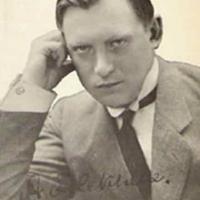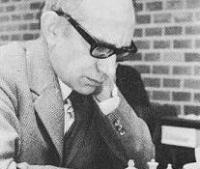
The Genius of the Combination
A Star Emerges
Alexander Alexandrovich Alekhine was born on October 31, 1892 in Moscow, Russia, the third son in a family where children and adults played chess. He learned at the age of seven, and from twelve Alekhine played seriously, especially by correspondence, and so he began to developing his analytical skills. His idols were Morphy, Anderssen, La Bourdonnais... and of course, Chigorin.
In February of 1909, at sixteen, he won the Russian Amateur Tournament in Saint Petersburg with 13 of 16, in Stockholm in 1912 he won the championship of the Nordic countries with 8.5 of 10, and in 1913 he won a match against Lewitzky in St. Petersburg 7 to 3. The same year he won first place in the Scheveningen tournament, with 11.5 of 13, half a point ahead of Janowski. A new star had emerged; Alekhine gradually began to conquer the world with his magical combinations that have delighted many generations.
A Russian Master in Germany
In January 1914, Alekhine tied for first place with Aaron Nimzowitsch in the All-Russian Masters Tournament at St. Petersburg, and both participated in the Tournament of Champions in St. Petersburg 1914, in which Alekhine finished third behind Lasker and Capablanca.
In July-August 1914, Alekhine won the international tournament in Mannheim, 19th Congress of the DSB (German Chess Federation Congress) in Germany, with 9.5 of 11, at which World War I broke out. After the declaration of war against Russia, the players (Alekhine, Bogoljubov, Bogatyrchuk, Flamberg, Koppelman, Maliutin, Rabinovich, Romanovsky, Saburov, Selezniev, Weinstein) were interned in Rastatt, Germany. Four of them (Alekhine, Bogatyrchuk, Saburov and Koppelman) were freed and allowed to return home in late October 1914. A fifth player, Peter Romanovsky, was released in 1915, and a sixth, Flamberg, was allowed to return to Warsaw in 1916. Alekhine made his way back to Russia via Switzerland, Italy, London, Stockholm, and Finland. When Alekhine returned to Russia, he helped raise money for Russian chess players who remained hospitalized in Germany, giving simultaneous exhibitions. In Moscow, 1918 he won a match against Rabinovich 3.5 to 0.5, and another 6 to 0 against Verlinsky in Odessa, the same year.

A Tale of Two Wives
In March 1920, Alekhine married Alexandra Batayeva. They divorced the next year. For a short time in 1920–1921; he worked as an interpreter for the Communist International and was appointed secretary to the Education Department. In this capacity, he met a Swiss journalist and commenter delegate, Anneliese Rüegg, who was thirteen years older than he was, and they married on March 15, 1921 and had a son. Shortly after, Alekhine was given permission to leave Russia for a visit to the West with his wife, from which he never returned. In June 1921, Alekhine abandoned his second wife in Paris and went to Berlin.
The Path to the World Championship
In 1921 he won several tournaments, in Budapest with 8.5 of 11, The Hague, with 8 of 9, and Triberg with 7 of 8; in 1922 he won at Hastings with 7.5 of 10, and in Carlsbad 1923, with 11.5 of 17. He took third place in New York, 1924 with 12 of 20 behind Laker and Capablanca, first place in Paris, 1925 with 6.5 of 8, first place in Baden-Baden, 1925 with 16 of 20, first place in Hasting 1925 with 8.5 of 9. In 1925, Alekhine broke his own world record of blindfold play, and played 28 games blindfolded in Paris (+22-3=3).
In 1926 Alekhine beat Max Euwe in a match 5.5 to 4.5 and challenged Capablanca for the world championship. Alekhine married for the third time, this time to Nadezda Vasiliev. In New York 1927, Alekhine took second place behind Capablanca, with 11.5 of 20.
In 1927, Alekhine's challenge to Capablanca was backed by a group of Argentinian businessmen and the president of Argentina, who guaranteed the funds. Organized by the Club Argentino de Ajedrez (Argentine Chess Club) in Buenos Aires, the match was played from September to November 1927; all the games took place behind closed doors. There were no spectators or photographs. Alekhine won the title, scoring +6 -3 =25. Alekhine's victory surprised almost the entire chess world, since he had never previously wrested a single game from Capablanca. Alekhine became the 4th official world champion of Chess after Steinitz, Dr. Lasker, and Capablanca.
Here are three more samples of the young Alekhine's play; we shall continue with him next week!






